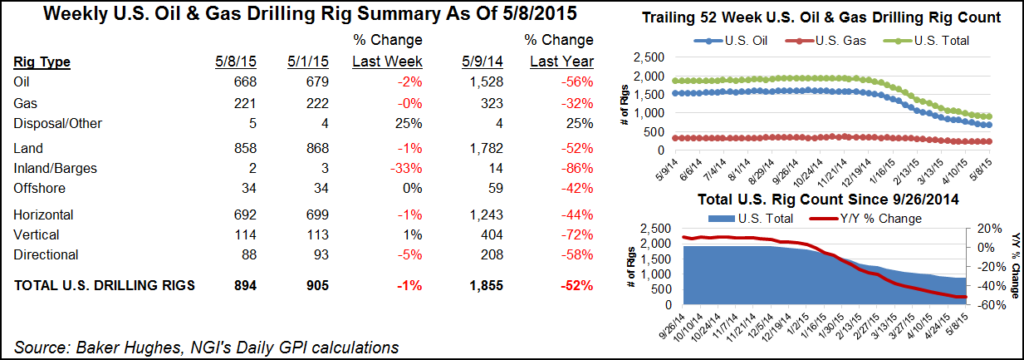NGI The Weekly Gas Market Report | E&P | NGI All News Access
U.S. Rig Count Decline Pauses at 41% of Year-Ago Level
U.S. natural gas drilling activity is but 58% of what it was a year ago, according to the latest rig census from Baker Hughes Inc., which was released Friday.

Gas rigs, at least on a percentage basis, have shown more staying power than oil-directed rigs, which at 594 units running are only at 37% of where they were a year ago. Overall, the U.S. rig count is only 41% of what it was a year ago, while North America stands at 42% of the year-ago tally. Canada, with 190 rigs running, is at 42% of its year-ago power.
Recent declines in the weekly U.S. rig count ended Friday with a splat rather than a bounce. The Baker Hughes Inc. count of active U.S. oil and natural gas rigs was static at 787 units.
For the week ending Oct. 23, two U.S. rigs left land drilling and two were added in the offshore, for a net change of zero. That’s a big change from preceding weeks, which have seen declines, some substantial, in the overall count (see Daily GPI,Oct 16;Oct. 9;Oct. 2).
In the United States, one oil rig left action, but one natural gas-directed rig joined the game. One directional rig was added, but one vertical rig was subtracted.
When it was all added up, the United States had 594 oil rigs running and 193 natural gas. On land, there were 749 active rigs in the latest count, 35 offshore and three in the inland waters.
Louisiana gained five rigs but Texas lost five (mainly in the Permian Basin). In Louisiana, two of the additions were in the Haynesville Shale, and one rig came back to the Tuscaloosa Marine Shale, according to Baker Hughes.
For any action, one had to look to the North American count as it was Canada that contributed all the action for the week, ending up with a total of 190 rigs active.
The North American count gained nine rigs overall to 977 as Canada added eight oil units and one gas-directed rig. Alberta gained a net of four rigs to end at 118 while British Columbia lost rigs to end at 28. Saskatchewan picked up a net of seven units to end at 41 (southwestern Saskatchewan added seven units on its own), while the other provinces were static with the previous week.
© 2024 Natural Gas Intelligence. All rights reserved.
ISSN © 1532-1231 | ISSN © 2577-9877 | ISSN © 1532-1266 |
